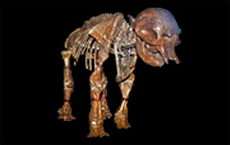Size doesn't matter: island mammals 'dwarfed' by lack of competitors and predators

The evolution of miniature or 'dwarf' versions of animals like elephants and hippos on islands is caused by lack of competition for food and the absence of predators, and not just because they are too large for their habitats, new research claims today.
The study, published in this month's issue of Evolution journal, examines the phenomenon of the 'Island Rule' which states that large mammals on islands evolve to be significantly smaller than their counterparts living on large continental land masses.
The researchers examined the fossilised remains of small elephants and other miniaturised mammals living on various sized Mediterranean islands in the Pleistocene and Holocene epochs, between 1.8 million and 4,500 years ago. Their findings suggest that this evolutionary tendency is caused by the specific way that predators, prey, and competitors for food interact in island ecosystems. They also found evidence that miniaturisation occurs for distinctly different reasons in carnivores and herbivores, and that herbivores are more dramatically affected by the phenomenon.
The team's findings show that for miniature herbivores such as hippos to evolve, there needs to be little competition for food on the island, and very few predators. In these circumstances herbivores tend towards miniaturisation as they do not need their size advantage to survive. The researchers think this could mean that over time there will be an increase in the number of offspring each female has in a lifetime, as smaller mammals tend to have more babies. In this way, size evolution on islands can occur very quickly as the island-dwelling herbivores are selected to expend more energy on reproduction at the expense of growth.
In the case of carnivores, however, the research team discovered that miniaturisation occurs less dramatically, and believe it is primarily caused by the size and abundance of their prey. If prey is scarce or small, then carnivores too will evolve to be smaller, as they will not need such a size advantage to hunt and compete for food.
Dr Shai Meiri from Imperial College London's Centre for Population Biology who carried out the research said: "Our study has shown that large mammals do not simply 'shrink' in response to the small size of their island homes. By comparing fossils of elephants from a number of islands of various sizes, we saw clearly that species' miniaturisation did not occur relative to the size of the island they inhabited. The complex interaction between mammals, their food and their competitors drives the evolutionary process, allowing mammals, particularly herbivores, to minimise their size whilst maximising their reproductive effort.
"Now that we have a clearer idea about what drives size evolution of large mammals on islands, we hope to investigate whether similar patterns of size and shape change exist among mainland mammals, and what effect climate change has on size evolution."
The research was carried out jointly by Dr Shai Meiri from Imperial College London's Centre for Population Biology and Dr Pasquale Raia, from the Università degli Studi Del Molise in Italy.
Source: Imperial College London















